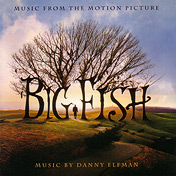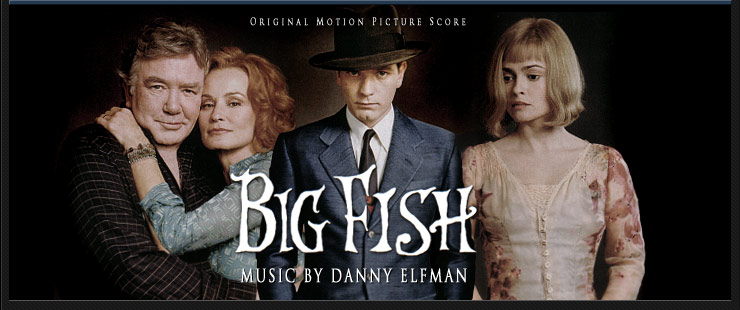
Review by Paul Cote - At this point, I don't think it would be hyperbole to claim that the director-composer relationship between Tim Burton and Danny Elfman stands as one of the most significant in recent cinema history. The two have worked on more than 10 films, and at their peak with the bittersweet wintry fairy tales in the early '90s, they could almost be said to be the musical and visual translation of the other's voice. And yet at a certain point in the mid-90s, the two artists began to take different paths. After the intensely close collaboration on The Nightmare Before Christmas, Burton and Elfman decided to take a brief break from each other. Burton went on to make Ed Wood while Elfman turned to more intimate personal dramas, developing a voice that created emotion through gradual and subtle building instead of outright thematic statements. And in this interim came the shift in their sensibilities. When Burton and Elfman returned to each other a few years later, Burton had temporarily lost interest in his anguished personal fairy tales and was caught up in more light-hearted popcorn fare like Sleepy Hollow and Planet of the Apes. Elfman provided brilliant scores for these films, but Burton's films left the composer with little room to fully demonstrate the nuanced emotional depth growing in his voice. This, however, all changes with Big Fish, a project that finally brings out the best and most personal aspects of both artists.
The wait has been more than worth it. Burton's film is the story of a son trying to come to terms with his dying father, Edward Bloom, who has spent his life locked in fantasy, seemingly isolated from his family in the real world. The bulk of the story is told through a series of fanciful episodes chronicling Bloom's life as he tells it, from his adventures with giants and werewolves to his connection to a dreamy paradise in the town of Spectre. Under the hands of a lesser director, the film could have easily fallen into cute and contrived sappiness, but Burton, with his natural gift for whimsy and his eye for the sadness that runs beneath fantasy's surface, turns the film into a rich and bittersweet masterpiece. Yet much of this gravity may have fallen to the wayside were it not for Elfman's immeasurable contribution, musically translating Burton's oft-ambiguous emotions here just as much as he did in Edward Scissorhands and Batman Returns. His music is playful and heartfelt but with a matured sense of melancholy that gives the film the weight it needs to keep from floating away as a giant sugar-puff.
Musically, the score could be described as fitting somewhere between the intimate subtlety of Good Will Hunting and The Family Man, the rustic Southern twang of Sommersby, the playful spirit of the Pee-wee movies, and even a touch of the thematic magic that marked Edward Scissorhands. This is not to imply that the music is derivative, for these aforementioned scores were all written when Elfman was still in the process of finding his voice as a composer. At this point Elfman's voice is fully developed and the ideas culled from these previous works are refined and improved upon with the confidence and mastery of a composer completely in his stride. For example, the Southern bluegrass element we heard in Sommersby naturally plays a significant role, but here Elfman's voice has evolved to the point where he can manipulate regional idioms into his music without losing himself to them. What also sets his score apart from Elfman's comparable personal dramas of the past few years is a fuller sound from Steve Bartek's orchestration, with greater resonance in the lower registers of the string section. The result is a score that maintains Elfman's delicate sense of intimacy, but with the aforementioned sense of gravity that anchors both the film and the score.
Though that isn't to say that the score isn't without a light-hearted and playful side itself. "The Growing Montage" is a wonderfully jaunty little piece, complete with a cameo from Elfman's signature "La-La-La" choir, while "Shoe Stealing" and "Rebuilding" feature robust and spirited Southern hoedowns. There is even a delightful show-tune in "Twice the Love (Siamese Twins Song)", a sort of amalgamation of Chicago and The Nightmare Before Christmas, surely to make many a fan wish the composer would return to song-writing. But where Elfman's innocent whimsy really finds its heart is with "Sandra's Theme", written to complement Bloom's storybook romance as he courts his future wife. It's the best kind of love theme, full of the earnest yearning and sprightly energy that made his score for Black Beauty so magical. The theme gets precious few airings on the album, returning only briefly for " The Journey Home", but those few moments are some of the score's most memorable.
 However, it is the sadness in fantasy that clearly has the biggest draw for Elfman, and here is where the heart of this score truly lies. To convey this side of the film, Elfman uses a theme for Jenny, a young woman from the mystical town of Spectre. Bloom is drawn to Jenny and nearly has an affair with her but ultimately leaves her for the sake of his wife and child. To reflect the duality of these two significant women in Bloom's life, Elfman reflects a variation on the theme for Sandra into a minor key for Jenny, creating one of the most achingly beautiful the composer has penned in a very long time. Innocent in its simplicity, gentle and tragic, "Jenny's Theme" embodies all of the fairy tale qualities that made Elfman so popular in the early '90s. In fact, so beautifully realized is this theme that it actually overshadows "Sandra's Theme" as it is both considerably more developed as a melody and occupies a larger portion of the score. This would seem odd at first until you realize that Elfman is not just using this theme to represent the supporting character. For when Bloom turns away from Jenny, he is not just turning away from an affair, he is turning away from Spectre and fantasy itself in favor of the responsibilities of a life in reality. But while he never again returns to Jenny and the world he left behind, a longing for both never leaves him and renders him distanced from his family, able to communicate only through the retelling of these wild fantasies. "Jenny's Theme" is the theme for this longing, haunting every corner of the score just as the longing continues to haunt Bloom. It plays as young Bloom forces himself to move on from Spectre ("Leaving Spectre") and returns when a grown-up Bloom re-enters the town to find it dying under the weight of reality ("Return to Spectre"). But nowhere does the score exemplify the tragedy of Bloom more than in the centerpiece, "Underwater". In a surreal transitional sequence, Bloom is submerged underwater in his car when a fish in a beautiful female form swims by, embodying all of the dreams and flights of fancy that Bloom will always keep but always be kept from pursuing. Elfman responds with the most wistful variation of "Jenny's Theme" in the score, slowly laying it out on chiming bells and the high notes of the piano while his children's choir ever-so-delicately harmonizes. It is perhaps the defining moment of both the film and score, weighing with the almost unbearable sadness of something that is magic, beautiful, and lost. However, it is the sadness in fantasy that clearly has the biggest draw for Elfman, and here is where the heart of this score truly lies. To convey this side of the film, Elfman uses a theme for Jenny, a young woman from the mystical town of Spectre. Bloom is drawn to Jenny and nearly has an affair with her but ultimately leaves her for the sake of his wife and child. To reflect the duality of these two significant women in Bloom's life, Elfman reflects a variation on the theme for Sandra into a minor key for Jenny, creating one of the most achingly beautiful the composer has penned in a very long time. Innocent in its simplicity, gentle and tragic, "Jenny's Theme" embodies all of the fairy tale qualities that made Elfman so popular in the early '90s. In fact, so beautifully realized is this theme that it actually overshadows "Sandra's Theme" as it is both considerably more developed as a melody and occupies a larger portion of the score. This would seem odd at first until you realize that Elfman is not just using this theme to represent the supporting character. For when Bloom turns away from Jenny, he is not just turning away from an affair, he is turning away from Spectre and fantasy itself in favor of the responsibilities of a life in reality. But while he never again returns to Jenny and the world he left behind, a longing for both never leaves him and renders him distanced from his family, able to communicate only through the retelling of these wild fantasies. "Jenny's Theme" is the theme for this longing, haunting every corner of the score just as the longing continues to haunt Bloom. It plays as young Bloom forces himself to move on from Spectre ("Leaving Spectre") and returns when a grown-up Bloom re-enters the town to find it dying under the weight of reality ("Return to Spectre"). But nowhere does the score exemplify the tragedy of Bloom more than in the centerpiece, "Underwater". In a surreal transitional sequence, Bloom is submerged underwater in his car when a fish in a beautiful female form swims by, embodying all of the dreams and flights of fancy that Bloom will always keep but always be kept from pursuing. Elfman responds with the most wistful variation of "Jenny's Theme" in the score, slowly laying it out on chiming bells and the high notes of the piano while his children's choir ever-so-delicately harmonizes. It is perhaps the defining moment of both the film and score, weighing with the almost unbearable sadness of something that is magic, beautiful, and lost.
Though the sadness for fantasy's loss does not necessarily imply that reality itself is painted with entirely bleak hues. For Bloom's relationship with his family, Elfman pens a warm melody that ultimately becomes the score's signature theme. Though the melody and orchestration are restrained enough to make it clear that the theme is grounded in reality and not fantasy, ultimately it resonates with hope and forgiveness as Bloom's family tries to come to terms with him in his final hour.
And as with any Elfman score, a plethora of smaller motifs are present to tie the edges of the score together. A somber fiddle motif represents the initial bitterness Bloom' s son has for his father's inability to connect with reality, most prominently heard in the first half of "Big Fish (Titles)". A shimmering chord progression also appears from time to time, referencing Bloom's relationship with the fish of the title. It accompanies the film's underwater opening shot, again in "Big Fish (Titles)".
All of these threads are tied together in the 11-minute "Finale". While the cue on the album unfortunately edits out most of the graceful shifts, you can still make out Elfman effortlessly jumping back and forth between boisterous fanciful adventure and reserved melancholy as Bloom's two worlds finally begin to merge. We are then brought full circle with a reprisal of both the bitter fiddle and shimmering underwater motifs from the opening before finally things finally resolve into the most heartfelt statement of the family theme, symbolically merged with whimsical chiming bells and children's choir as the film fades.
My only real complaint stems not from the score itself but from its shoddy presentation on the album, which is the reason for the slightly-less-than-perfect rating. 40 minutes of score is often held as the ideal length for a film music album, but a score this structured needs nearly every piece to work. When every passage of music merges into and influences the next, you can't isolate highlights and expect them to stand as firmly on their own. It's like trying to read a novel that somebody's edited so that only their favorite passage remain -- they may be the best passages in the book, but they don't tell the story by themselves. The film provided Elfman with the rare opportunity to write long stretches of fully developed music without interruption, but the album edits them to the point where they almost come across as choppy and fragmented. This is no doubt at least partially due to the fact that a third of the album is comprised of various period songs, few of which anybody is likely to get excited over.
Still, obviously enough of the score remains on the album for me to ramble endlessly on about it, and fragmented as it can seem at first, enough important pieces of the puzzle are there so that one can at least appreciate some of the masterful nuances of this work. It's a powerful enough score that even a butchered suite stands as a satisfying listen when separated from the film. I find myself feeling grateful that Elfman was able to approach this work with Burton now after his voice has matured so much. I'm sure that the Elfman of 10 years ago would have done something very special too, but there's a level of depth here that I think he simply could not have reached without the years of trial and error that preceded it. Big Fish is an insightful masterpiece that unites Elfman's prowess for rich subtlety with his gifts as a melodist. Fans of both the new and the old Elfman, as well as anyone with an appreciation for film music that does more than state the obvious, would do very well to pick this up. It's one of Elfman's finest achievements.
Nominations:
Academy Award: "Best Original Score"
Golden Globe Award: "Best Original Score"
Winner:
Broadcast Film Critics Award: Best Composer

Music Composed and Produced by (8-22) Danny Elfman
Orchestrations by Steve Bartek, Jeff Atmajian, David Sloanaker, Edgardo Simone
Orchestra Conducted by Nick Ingman
Recorded and Mixed by Dennis Sands at Air Studios, Lyndhurst Hall, London

Label (Catalogue): Sony Classical / Epic, (SK 93094)
Availability: In print
Purchasing options: Available at Amazon.com

Back to filmography index
|
|


01. Man Of The Hour (3'45)
Pearl Jam
02. Dinah (2'17)
Bing Crosby
03. Everyday (2'09)
Buddy Holly
04. All Shook Up (1'58)
Elvis Presley
05. Five O'Clock World (2'10)
The Vogues
06. Ramblin' Man (4'57)
The Allman Brothers
07. Let's Work Together (3'14)
Canned Heat
08. Pictures (0'46)
09. Big Fish (Titles) (4'32)
10. Shoe Stealing (0'56)
11. Underwater (1'52)
12. Sandra's Theme (2'26)
13. The Growing Montage (2'41)
14. Leaving Spectre (1'59)
15. Return to Spectre (2'13)
16. Rebuilding (1'19)
17. The Journey Home (2'10)
18. In the Tub (1'21)
19. Sandra's Farewell (1'16)
20. Finale (11'10)
21. End Titles (2'38)
22. Jenny's Theme (1'46)
23. Twice the Love (1'48)
(Siamese Twins' Song)
Performed by:
Bobbi Page & Candice Rumph
Written by:
Danny Elfman & John August
Danny Elfman's music at:

|

|















